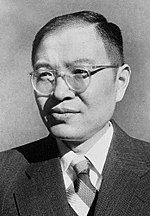Zhang Wentian, Date of Birth, Place of Birth, Date of Death
TweetZhang Wentian
Leader of the communist party in ChinaAbout Zhang Wentian
- Zhang Wentian (simplified Chinese: ???; traditional Chinese: ???; pinyin: Zhang Wéntian; Wade–Giles: Chang Wen-t'ien; 30 August 1900 – 1 July 1976), also known as Luo Fu (Chinese: ??; Wade–Giles: Lo Fu), was a high-ranking leader of the Communist Party of China. Born in Nanhui, he attended engineering school in Nanjing and spent a year at the University of California.
- He later joined the Chinese Communist Party in 1925 and was sent to study at Sun Yat-sen University in Moscow, from 1926 to 1930.
- He was a member of the group known as the 28 Bolsheviks, but switched to supporting Mao Zedong during the Long March.
- He was General Secretary of the Communist Party of China from 1935 to 1943, when the post was abolished.
- He remained a member of the Politburo, but ranked 12th of 13 in the 7th Politburo and reduced to Alternate Member in the 8th Politburo. He was First Vice Minister of Foreign Affairs of the People's Republic of China from December 1954 to November 1960.
- He was a participant of the Long March, and later served as an ambassador to the Soviet Union from April 1951 to January 1955.
- At the Lushan Conference in 1959 he supported Peng Dehuai and lost power along with Peng.
- During the Cultural Revolution he was attacked as an ally of Peng and Liu Shaoqi; he was rehabilitated by Deng Xiaoping after Mao's death.
Read more at Wikipedia


 Date of Birth:
Date of Birth:  Place of Birth: Shanghai, China
Place of Birth: Shanghai, China